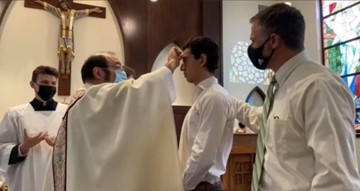
Catholicism sees in Jesus Christ the full embodiment of God. Since God became human,
then God is seen, touched, and heard in the context of human living. This is the principle of
sacramentality and is our second defining trait.
The Church celebrates certain rituals that make the saving presence of God tangible to us in
different ways. They are wonderful moments of encounter with God that can deeply affect our
lives. In Catholicism, there are seven such rituals that we call the Sacraments, with the Eucharist
as our core Sacrament.
The celebration of the Sacraments, especially the Eucharist, plays a vital role in the life of the
Gannon community. Catholic members of the University community are regularly afforded the
opportunities for celebration of the Eucharist, other Sacraments, prayer, spiritual reflection,
and other forms of authentic devotion. All members of the University community are welcome
and encouraged to attend the celebration of the Eucharist.
“The presence of priests, sisters, and experts from other denominations and religions on the Gannon campus provided a constant reminder to me of the centrality of faith in all our lives.”
–Gannon Alumnus
However, the sacramentality of Catholic belief embraces more than our sacred rituals. As a
Catholic university community, we believe that we live in a sacred world created by God. For
this reason, every tangible element of creation from the natural environment to human persons
provides an opportunity to encounter something of God’s presence. Hence, every tangible
element of creation can be a “sacrament” of God.
Understood in this way, the principle of sacramentality affirms that as we study and explore
the human condition and the natural environment, we are in actuality discovering more and
more about the presence of God. Furthermore, our day-to-day activities, our service to others,
our interaction with other people and ideas, our special celebrations, and our opportunities
for celebrating other forms of authentic spirituality on campus can all be “sacraments” of God
in our midst.